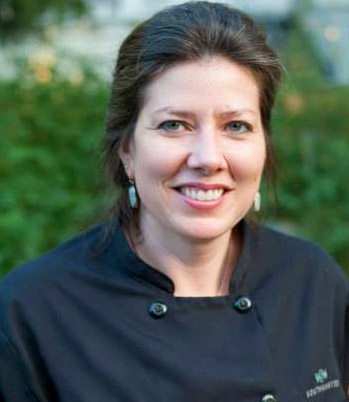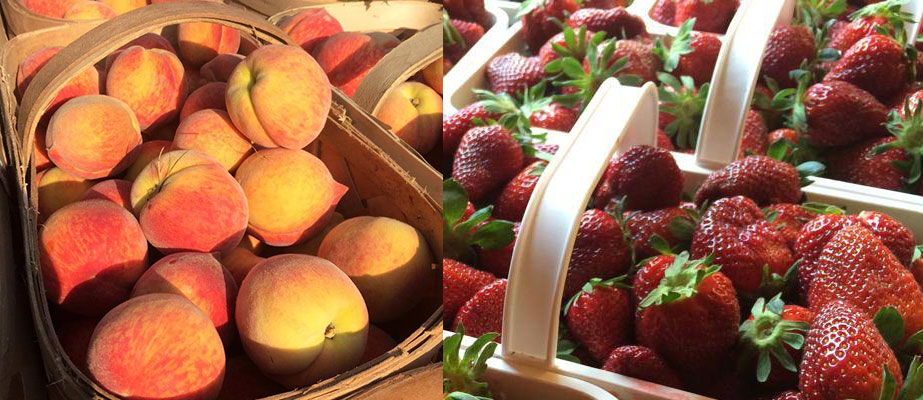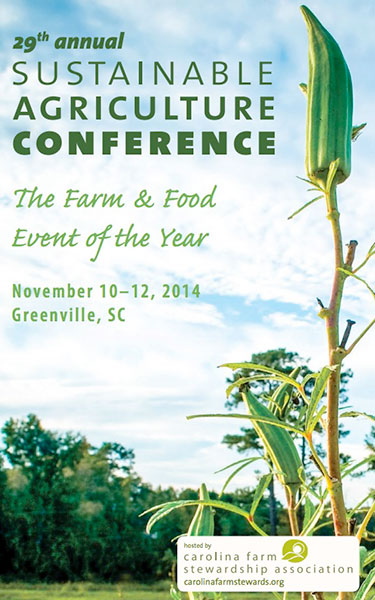PCG Pitches In For Upcoming Sustainable Agriculture Conference
How do you serve a large group of people dedicated to local sourcing? And do it efficiently? Just ask PCG Executive Director Kris Reid.
Since 2009, Kris has been serving as the Food Coordinator for the Sustainable Agriculture Conference – an event hosted by the Carolina Farm Stewardship Association (CFSA). The 29th Annual SAC will be held November 10-12 at the Hyatt Regency in Greenville, SC – and she is more than ready for it.
Kris is no stranger coordinating meals on a large scale. As Executive Chef at Southminster, she has plenty of opportunities to hone her organizational skills.
 “Sourcing from small local farms creates challenges for large public venues,” she explains. “Besides delivery issues, other concerns may be food safety as well as standardized packaging for both produce and cuts of proteins. It all creates a barrier that larger distributors are just now beginning to step up and deal with.”
“Sourcing from small local farms creates challenges for large public venues,” she explains. “Besides delivery issues, other concerns may be food safety as well as standardized packaging for both produce and cuts of proteins. It all creates a barrier that larger distributors are just now beginning to step up and deal with.”
“During the event I work with the venue culinary team to serve upwards of 2500 meals over the course of the three-day conference. In 2009, there were over 50 deliveries made to the first site I worked with. The meals were comprised of 80% locally sourced products from small, mostly organic, farms. Over the years the distribution of local food has evolved, as has sourcing for the conference.”
Kris did take a hiatus from her SAC duties in 2013, and credits last year’s coordinator, Danielle Goldfischer Rowland of Rowland Family Farm, for making things much easier for her this time around. “Danielle helped streamline this process, which helped reduce deliveries to the site and relieved some of the account payable nightmare that can occur when dealing with multiple small farms and deliveries,” she says.
 In addition to Kris, another Guild member will be represented at the conference. Brent Barbee of Barbee Farms is providing the strawberries and peaches which will appear on select menu items.
In addition to Kris, another Guild member will be represented at the conference. Brent Barbee of Barbee Farms is providing the strawberries and peaches which will appear on select menu items.
The majority of the produce will be coming from Eastern Carolina Organics of Durham, NC (one of the SAC sponsors). Proteins will be provided by Firsthand Foods, another Durham-based distributor that works with pasture-based livestock producers. These producers raise their animals humanely, without feeding antibiotics or animal by-products, nor do they use added hormones.
Additionally, specialty produce items, eggs, dairy, and pantry items are being sourced through Leading Green Distributing, which was named Business of the Year in 2013 at the Sustainable Ag Conference.
All of these distributors deliver to Charlotte and surrounding areas.
Carolina Farm Stewardship Association is a nonprofit organization which advocates for fair farm and food policies, builds the systems that organic family farms need to thrive, and educates communities about local, organic farming.
The 29th Annual Sustainable Ag Conference will feature a 56-table Exhibitor Hall, 55 workshops, nine “Hands-on Intensives”, two “Get-Your-Hands-Dirty” off-site learning opportunities, and many other activities. Prior to the conference, there will be three distinct pre-conference tours where participants will experience some of the Upstate’s most innovative farms and restaurants.
 Cost for attending this event starts at $90 ($115 non-member) for the Wednesday only workshops to $309 ($359 non-member) for the All-Inclusive Conference Package. Pre-Conference events priced separately.
Cost for attending this event starts at $90 ($115 non-member) for the Wednesday only workshops to $309 ($359 non-member) for the All-Inclusive Conference Package. Pre-Conference events priced separately.
Click here to download the Official 2014 Sustainable Ag Conference Brochure which includes the complete pricing charts and registration form. Registration can also be completed online – Click Here.
As you can see, being the Food Coordinator for this major event is a significant undertaking. So why with a full-time job and other non-profit responsibilities, does Kris Reid eagerly do this?
“It’s simple, really,” she says. “If we are going to continue to develop our local food chain into a more cohesive system capable of serving our communities, we need to drive attention to the farmers, producers and distributors that can help us get there. SAC is a huge opportunity to show people that yes we can eat locally, and we can do it on any scale.”

